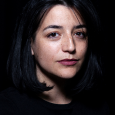Over 1,500 kilometers away from newsrooms in Prishtina, the judicial process against former leaders of the Kosovo Liberation Army (KLA) continues in The Hague, the Netherlands.
In early April, a number of Kosovo media outlets sent journalists to The Hague to attend the first court hearing against “Thaçi et al.”, the main trial against “the four“: Hashim Thaçi, former president of Kosovo; Jakup Krasniqi, former speaker of the National Assembly; Rexhep Selimi, former Assembly member; and Kadri Veseli, former chairman of the Democratic Party of Kosovo (PDK). Besides this occasion, most reporting on the trials has been done from a distance and largely rely on the public sessions of the trials which are broadcast with a 45 minute delay on the Specialized Chambers website and on RTK, Kosovo’s public broadcaster.
A month later, the Kosovo Specialist Chambers and Specialist Prosecutor’s Office, known as the Special Court, organized a two-day training event for Kosovar journalists about the court’s mandate and processes. The team of participating journalists went to follow the hearing against Pjetër Shala, a former member of the KLA, from the public gallery in the court.
Among the rules in the public gallery are that no electronic devices are allowed, so the journalists had to use a notebook and pencil. Falling asleep is also forbidden.
The prosecutor began questioning a protected witness. Part of the testimony was unintelligible due to voice modification, which is done to protect the identity of the witness. Within a few minutes, the trial panel decided that the session should be closed to the public.
This was no surprise to the attending journalists. Some of the most commonly faced hurdles to reporting on the trials are the frequency of closed or private sessions and excessive voice modification.
The judicial processes at the Special Court – particularly the proceedings against “the four,” which include important figures from the KLA and the last two decades of political life in Kosovo — are being closely followed by the public in Kosovo. Despite this close attention, there are a number of difficulties journalists encounter when attempting to report on the court.
Who is being tried in The Hague?
Thaçi et al.
Hashim Thaçi, Kadri Veseli, Rexhep Selimi and Jakup Krasniqi are charged with individual criminal responsibility and with criminal responsibility as superiors for:
Crimes against humanity (persecution, imprisonment, other inhumane acts, torture, unlawful killings and enforced disappearance of persons) and
War crimes (illegal or arbitrary arrest and detention, cruel treatment, torture, and unlawful killings).
Salih Mustafa
On December 16, 2022, Mustafa was found guilty of the war crimes of arbitrary detention, torture and unlawful killing and was sentenced to 26 years in prison. The court ordered Mustafa to pay 207,000 euros as compensation to the victims. Mustafa's defense is appealing the decision.
Pjetër Shala
Shala is an alleged member of the KLA stationed in Kukës, Albania. The crimes Shala is accused of committed occurred approximately between May 17 and June 5, 1999 against individuals detained in a metal factory in Kukës allegedly used by the KLA.
Hysni Gucati and Nasim Haradinaj
On May 18, 2022, Gucati and Haradinaj were found guilty of disclosing information protected by the Special Court Law, including identification of potential witnesses. They were sentenced to four years and five months in prison and a fine of 100 euros. In an appeal, the court reduced their sentences by two months.
Difficult reporting
The establishment of the Special Court in 2015 caused a stir in Kosovo and remains a controversial topic. The court is generally seen as an unfair imposition by the international community on Kosovo. Some critics argue that the court was created to pass judgment on the KLA and call into question the liberation narrative about the war.
Dissatisfaction with the court has been channeled into protests. On April 2, the day before the trial against Thaçi et al. began, thousands marched through the streets of Prishtina under the slogan “Liria ka emër” (“Freedom has a name”) in support of KLA leaders on trial in The Hague.
The trial is not just of local interest, it is also making headlines internationally. All this attention, together with the challenges of reporting, increase the pressure of journalists who report on the court in Kosovo.
“Objectivity and reporting of the facts explaining the progress of the case is very important in such sensitive cases,” said Xhorxhina Bami, a journalist at the Balkan Investigative Reporting Network (BIRN) who reports on the Special Court.
Ardit Kika, a journalist at the KOHA group who covers the justice sector, has been following the Special Court since 2022. Even for him, reporting during the first days of the judicial process against Thaçi et al. was more high pressure than usual.
“The session was broadcast live on television and I also had a great sense of responsibility as I was reporting on the trial that seemed to me to be followed by the whole of Kosovo,” said Kika.
Because journalists cannot be in The Hague all the time to report directly, they follow the broadcast of the hearings on the court’s website, on RTK or from another news agency. The main source of information for journalists is directly from the Special Court itself. The Media Communications Division of the Special Court holds regular weekly press conferences and publishes announcements and documents about court hearings on the Court’s website and official Twitter account.
But things get complicated when the hearings, in which the witnesses testify, are closed to the public, and therefore also to journalists.
As in a May 5 session in the Pjetër Shala trial, the sessions in the Special Court are often closed in order to protect witnesses in case identifying information could be revealed during the testimony which could put them in danger.
According to journalists, this is preventing consistent and comprehensive coverage and makes this judicial process inaccessible.
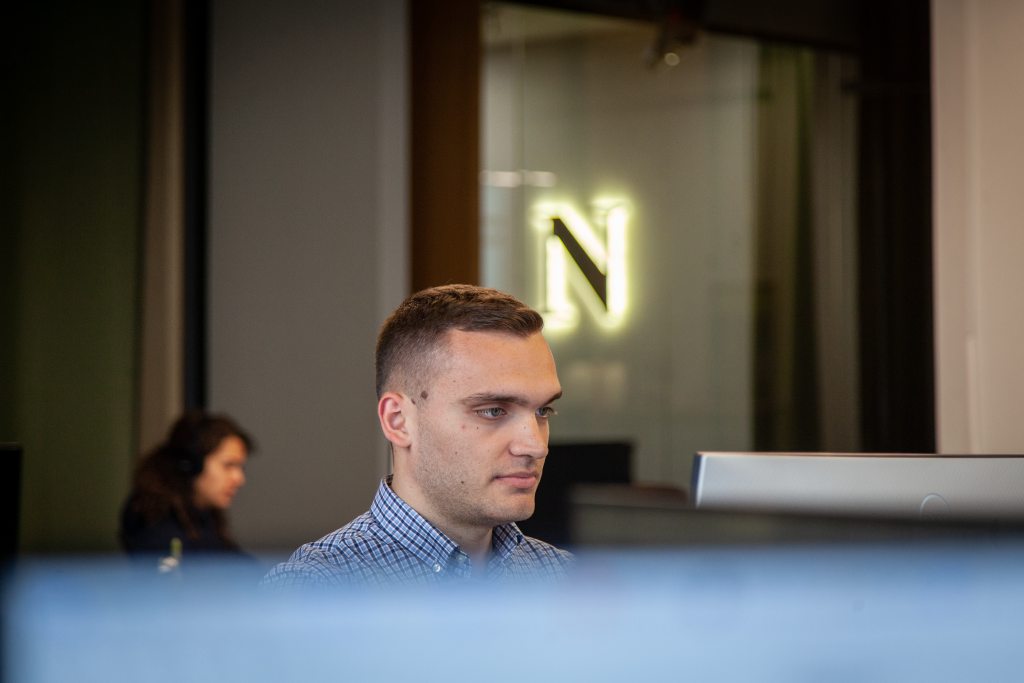
Besian Beha, a journalist at the news outlet Nacionale, says the main difficulty in reporting on the court is that the hearings are mostly private or closed. Photo: Majlinda Hoxha / K2.0.
Besian Beha, a journalist at the news outlet Nacionale, has been following the developments in the Special Court since 2020, when Hashim Thaçi, Jakup Krasniqi, Rexhep Selimi and Kadri Veseli surrendered to the court after the indictment against them was confirmed.
According to Beha, the main difficulty in reporting on the court is that the hearings are mostly private or closed and only occasionally opened to the public. This means that when witnesses refer to information they gave in private hearings, journalists are unable to understand the context.
For Beha, it is essential for Kosovar journalists to be able to report on the testimonies and evidence so that the public knows the basis for the final verdict.
Bami pointed out the same challenge, which for her makes communication with the court “more lukewarm because they do not provide additional information on the grounds that such hearings are held to protect witnesses.” According to her, a solution that would facilitate court reporting and monitoring would be if the Special Court would provide summaries of testimony without providing identifying information.
This concern was recently raised by the trial panel.
On May 17, Charles Smith, presiding judge in the Thaçi et al. case, expressed concern that almost all of the evidence so far has been heard in private or closed sessions. He reminded the parties that the accused are entitled to a fair and public hearing and that there is public interest in these proceedings taking place publically, as far as possible.
That same day, the panel issued an oral order seeking submissions from the parties, by May 31, regarding concrete steps that could be taken by the parties and the panel to ensure a greater degree of publicity. The court instructed the parties to take into account the need for the trial to be open for everyone.
Smith said the panel will consider the parties’ proposals to release redacted versions of the transcripts of private or closed hearings so the public can better understand what is going on.
Michael Doyle, spokesman for the Special Court, told K2.0 that the panel’s issuance of this order demonstrates the Trial Panel’s awareness of the difficulties associated with the proceedings taking place in private or closed session. According to him, the need for transparent proceedings with the safety and security of witnesses testifying in court must be balanced. Doyle said that since May 17, the number of testimonies in the open session has increased.
On May 31, the Specialist Prosecutor’s Office (SPO) proposed measures to increase the publicity of the proceedings. However, one of proposals was that the witness be examined entirely in private session, which according to the SPO would allow “the most efficient and secure examination of the witness possible.” After that, a redacted version of the transcript of the testimony would be made public.
An email from the defense team to the SPO opposed this proposal, claiming it “would violate the rights of our clients to be tried publicly.” According to the defense, an essential component of publicity is that “the public retains the ability to monitor proceedings as they unfold” and that “being informed of developments long after the fact is not compatible with the right to a public trial, nor is it conducive to public discourse.”
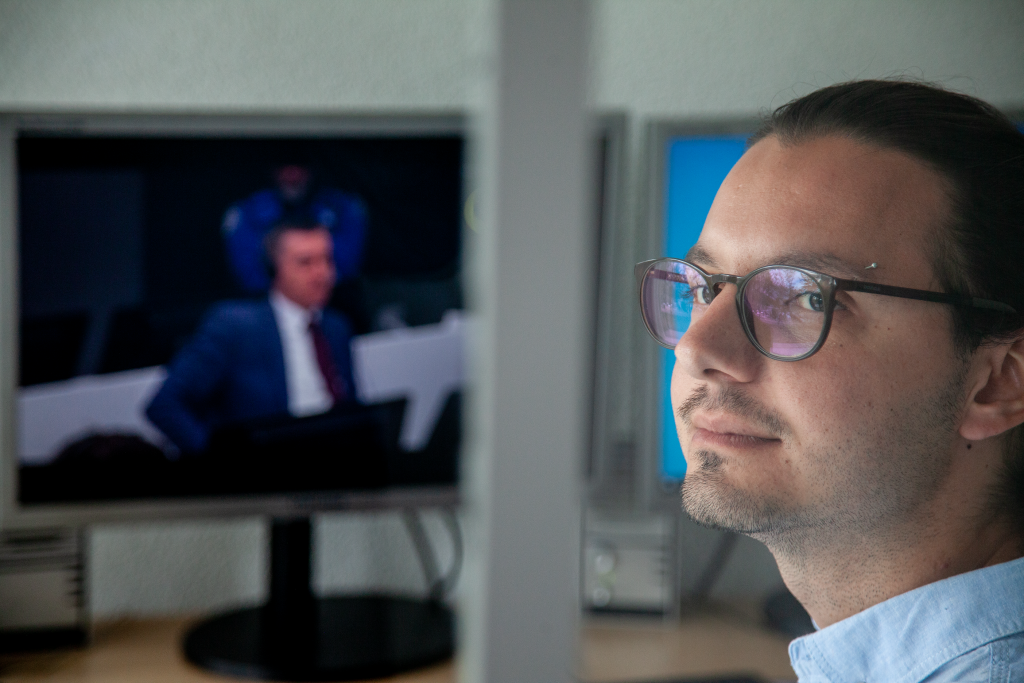
Ardit Kika, a journalist at KOHA group, says that there have been cases when he had to make the decision not to report at all on certain sessions due to excessive voice modification. Photo: Majlinda Hoxha / K2.0.
Besides closed or private hearings, another measure to protect witnesses is voice modification. All the interviewed journalists mentioned instances where excessive voice modification made the witnesses’ statements unintelligible.
Kika says that there have been cases when, due to uncertainty, he had to make the decision not to report at all on certain sessions.
“One of the most difficult cases I’ve had was precisely in the case of Pjetër Shala, when the [witness’s] voice was so deformed that it created great opportunities for me to be wrong. I called a colleague to listen together and all we could conclude was that we couldn’t hear it well and it is better not to report it at all,” said Kika. “You don’t know if it’s more important for the public what you didn’t understand from the testimony with a distorted voice than what you end up reporting.”
In 2022, the Kosovo Institute for Justice (IKD) published a report on the work of the Special Court. In addition to excessive voice modification, the report notes another problem. Witnesses are often asked closed questions, in which a “yes or no” answer is required, and their answer is not heard.
Doyle of the Special Court told K2.0 that “the Judges continuously remind the parties to wait five seconds after a question is posed in order to respond, so that both a translated question and its response can be clearly heard.” He added that transcripts of public proceedings are posted several days after each hearing, so that if any part of the public testimony is not heard, it can be read later in the public transcript.
But for daily news journalists, this comes too late.
The hearings are broadcast with a 45-minute delay on the Special Court’s website. This is in case they need to be redacted, for example if a witness provides confidential information that would compromise his identity or that of other persons involved in the case. Meanwhile, the hundreds of accompanying documents published on the Special Court’s website are often redacted prior to publication to hide sensitive information.
There have been cases when the Special Court has decided that information is confidential after the publication of documents and asked the media to remove the information from their articles. This practice has also been criticized in previous years.
The IKD report also mentioned cases during 2021 when the media were asked to remove the information that had already been made public: “On October 4, the court issued an order after the session, from the public broadcast of the session, the public transcript, the audio visual recording to remove a part, which they considered to contain confidential information. Among other things, the persons, media, organizations, who have the entire transcript or even the part containing this confidential information were ordered not to disclose it to other persons or other organizations. Otherwise, according to the order, criminal proceedings would be initiated.”
This practice has continued and journalists in The Hague have mentioned similar recent instances.
Concerns about transparency
Clarity in reporting is crucial when it comes to court proceedings taking place at the Special Court.
According to Besnik Gashi, a journalist at Insajderi news portal, reporting on the court requires more precision than on other topics from the judicial system in Kosovo. This is due to the ambiguities of the document materials and because of the considerable gap created by the editing of the materials.
“Let’s say, the almost main source of information for reporting is the submissions and complaints of the defense, the prosecution, as well as the decisions taken by the first and second instance of the court. Usually, they are published as redacted and the unredacted version can be published a month later, which creates a delay in the document and confuses journalists whether to report on that issue or not,” said Gashi.
Journalists also note that they do not have the opportunity to receive additional information from the Specialized Prosecutor’s Office (SPO).
“They don’t offer any clarification on almost any question. Normally, the Prosecutor’s Office has its duty to carry out investigations and does not offer them to the public, but in some topics, it is impossible to carry out the news articles because there is no answer from the Prosecutor’s Office,” said Beha. “‘We do not comment on this topic’ is the answer we usually get from this institution. In eight years of existence, the Specialist Prosecutor has given only one interview to the Kosovo media.”
In a statement the SPO told K2.0 that it seeks to be transparent within the limits — legal, professional and ethical — that apply to prosecutors. The SPO also noted that the creation of the Special Court and its location in The Hague was a result of the climate of intimidation in Kosovo towards witnesses.
Journalists also criticized the SPO for their rare appearances in the media. The SPO told K2.0 that prosecutors speak best in court and that the organization “looks always to find ways to increase the amount of proceedings that are made public, while also providing the necessary safeguards for witnesses”.
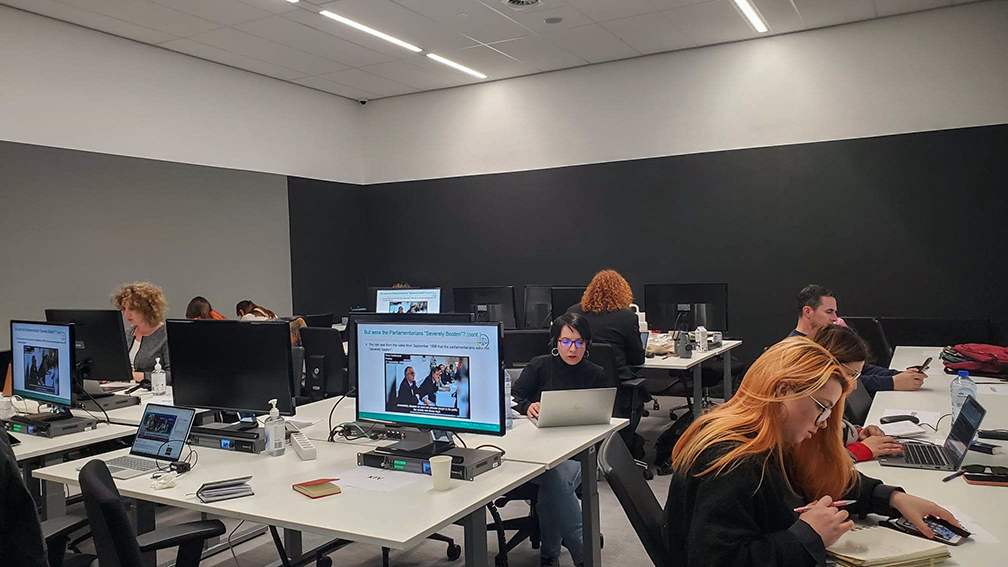
In early April, a number of Kosovo media outlets sent journalists to The Hague to attend the first court hearing against “the four.” Photo: Xhorxhina Bami.
Journalists also criticized the Special Court for not notifying newsrooms directly when new documents are published on the website or when existing documents are redacted.
“The documents are available only on the website and are never forwarded to the email of the media, either in the form of an announcement or a press release, as is the institutional practice of judicial institutions in Kosovo,” said Besnik Gashi. “However, I am convinced that they are responsive to the questions that come to them from journalists and answer within a short period of time. On the day when some of the media reported about the one-day visit of former President Thaçi to Kosovo, I received a response from the Special Court within 15-20 minutes regarding the case”.
Lavdim Makshana, who works at IKD, which monitors the justice system in Kosovo including the Supreme Court, says that these circumstances are reducing the transparency of the court.
“The transparency of a public institution in relation to the citizens is one of the main principles of the work of such an institution, because we know that it is very important to strengthen the public’s trust in this court,” said Makshana. “If we look at it from the moment when the first trials started, it was not the best level of transparency. This causes dissatisfaction among the citizens.”
Some of the other issues that damage the transparency of this institution, according to Mekshana, are the excessive redacting and the delay in translating documents into Albanian. All the documents that are published are initially in English and are translated a few weeks later into Albanian, which slows down reporting.
“I’m taking an example recently, the last translated document was on April 6, since that date many other supporting documents have been issued, which were only published in English, but not in Albanian,” he said on May 15.
From April 6 to May 15, over 100 new documents were published on the court’s website, but none of them were translated into Albanian. According to the Law on the Special Court and SPO, its official languages are Albanian, Serbian and English, therefore all documents must be translated into the three languages.
“As much as we know the English language, the terminology used by the Special Court is complex and this creates problems in reporting, as we aim to provide the public with accurate reporting in simple language,” said Beha from Nacionale.
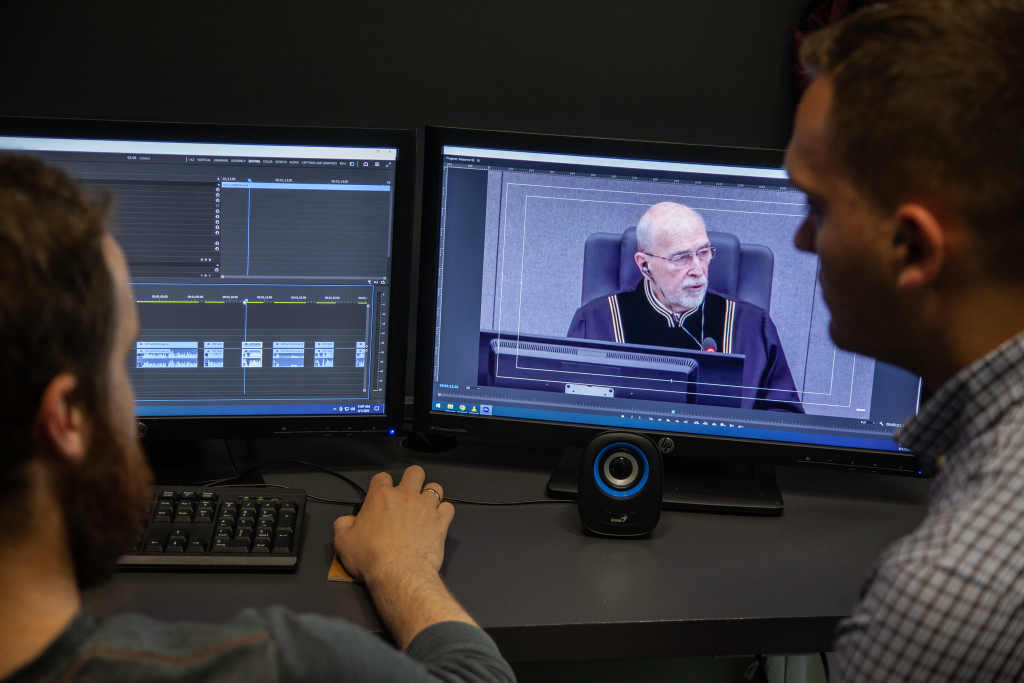
This trial is not just of local interest, it is also making headlines internationally. Photo: Majlinda Hoxha / K2.0.
Doyle, a Special Court spokesman, told K2.0 that many documents are released in English immediately, before being translated, to make it easier for people to follow the evidence.
“Certain documents are then given priority for translation purposes. First are those which under the Law must be translated into a language the accused understands. Further, the Judges, as well as the Prosecution and the Defence can indicate which documents they would like to have translated as a matter of priority,” Doyle said, adding that as it is necessary to ensure that documents are translated to the highest standards, it may take some time before to complete the translations into Albanian and Serbian in cases where the working language is English.
Physical distance itself limits the type of reporting and impoverishes it according to Gashi, because from a distance you cannot capture the elements necessary for immersive reporting, such as the non-verbal language of the parties. Kika, a journalist for KOHA, thinks the technical problems are the same even if journalists could follow the sessions in The Hague.
“I think reporting would have been much easier if the court and journalists had been in the same place. However, we have been in The Hague, 20 or so journalists, and we have seen that the technical problems are repeating there as well,” said Kika, adding that this should be worrying for the whole court and other parties.
Feature image: Majlinda Hoxha / K2.0.





